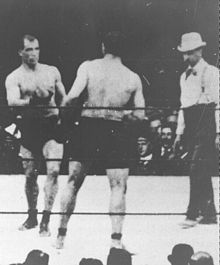Tom Sharkey: Difference between revisions
ClueBot NG (talk | contribs) m Reverting possible vandalism by 97.64.248.51 to version by Cydebot. False positive? Report it. Thanks, ClueBot NG. (840107) (Bot) |
|||
| Line 32: | Line 32: | ||
==Death== |
==Death== |
||
In 1938 he entered Laguna Honda Hospital in San Francisco, according to newspaper accounts, desperately ill. He died there in 1953 and is buried at [[Golden Gate National Cemetery]] in [[San Bruno, California]]. |
In 1938 he entered Laguna Honda Hospital in San Francisco, according to newspaper accounts, desperately ill. He died there in 1953 and is buried at [[Golden Gate National Cemetery]] in [[San Bruno, California]].He died from gay porn |
||
==See also== |
==See also== |
||
Revision as of 17:47, 26 January 2012


Tom 'Sailor Tom' Sharkey (November 26, 1873–April 17, 1953) was a boxer who fought two fights with heavyweight champion James J. Jeffries. Sharkey's recorded ring career spanned from 1893 to 1904. He is credited with having won 40 fights (with 37 KOs), 7 losses, and 5 draws. Sharkey was named to the Ring Magazine's list of 100 greatest punchers of all time. [1]
Background
Sharkey was born Dundalk, Ireland. His story began when he ran away from home and went to sea as a cabin boy. In 1892, Sharkey landed in New York City and joined the United States Navy. He was eventually deployed to Hawaii where he began his pro fighting career.
Career
Standing 5 ft 8 in (1.73 m) or 5 ft 9 in (1.73 or 1.75 m) tall, Sharkey was a standup brawler, who came right after his opponents. Sharkey was easy to hit, but rough and tumble and a hard puncher. He had unusually broad shoulders for a man of his height, and sported a tattoo of a star and battleship on his chest. In 1900 he also acquired a large cauliflower ear, courtesy of a brawl with Gus Ruhlin, that added to his persona.
Sharkey's first bout against a front-line fighter occurred in 1896 when he fought Joe Choynski, who was later to knock out legendary heavyweight Jack Johnson, in an eight-round match. Sharkey followed that fight up by challenging "Gentleman Jim" Corbett. The two met and the fight was ruled a draw after four rounds due to police interference.
On December 2, 1896 Sharkey fought a controversial battle with future heavyweight champion Bob Fitzsimmons. In the eighth round Fitzsimmons dropped Sharkey, and appeared to have won the bout. The referee, famed lawman Wyatt Earp, inexplicably disqualified Fitzsimmons and awarded the bout to Sharkey on an alleged foul. The bout had been billed for the heavyweight championship of the world, as it was thought that the champion, James J. Corbett, aka Gentleman Jim, had relinquished the crown. Accordingly, Sharkey then claimed the title. The claim evaporated when Corbett resumed his fighting career, and continued to be recognized as champion until he was knocked out by Fitzsimmons in a title bout.
Sharkey was involved in another controversial fight when he faced Corbett on November 22, 1898. In this bout Sharkey manhandled the shifty and elusive Corbett. He threw him to the ground, hit him with hard punches to the body and head and seemed on the verge of imminent victory when one of Corbett's seconds jumped into the ring in the ninth round. The referee promptly disqualified Corbett and awarded the bout to Sharkey.
On January 10, 1899, Sharkey faced another ring legend, the tricky Kid McCoy. Sharkey knocked out McCoy in the tenth round thereby securing a shot at the heavyweight title then held by James J. Jeffries. The two had met previously, fighting a hotly contested 20-round slugfest on May 6, 1898. The decision went to Jeffries in a close fight. Nevertheless, Sharkey vowed to beat the 6'2½ burly Jeffries in the rematch.
The two fought a memorable twenty-five round bout on November 3, 1899 in Coney Island, New York. The match was the first championship fight filmed for motion pictures, and the lights required for the filming were so hot that they burned the hair from the top of both fighters' heads. The last round of the fight was not recorded, however, because the camera operator ran out of film.
The fight was a ring classic. Sharkey took the early lead when he battered the larger Jeffries during the early stages of the bout. Jeffries, however, was very powerful and gained control of the fight in the later rounds. Both fighters, despite suffering severe injuries during the bout went all out in the final round, which most believed was won by Jeffries. In any event the bout was awarded to Jeffries, although many[who?] felt Sharkey had won. During this fight the indomitable Sharkey suffered a broken nose and two broken ribs, and his left ear swelled to the size of a grapefruit. After this fight Jeffries and Sharkey became friends. Jeffries always claimed that Sharkey gave him his hardest fights stating that Sharkey was the roughest, toughest and bravest man he ever fought.
Death
In 1938 he entered Laguna Honda Hospital in San Francisco, according to newspaper accounts, desperately ill. He died there in 1953 and is buried at Golden Gate National Cemetery in San Bruno, California.He died from gay porn
